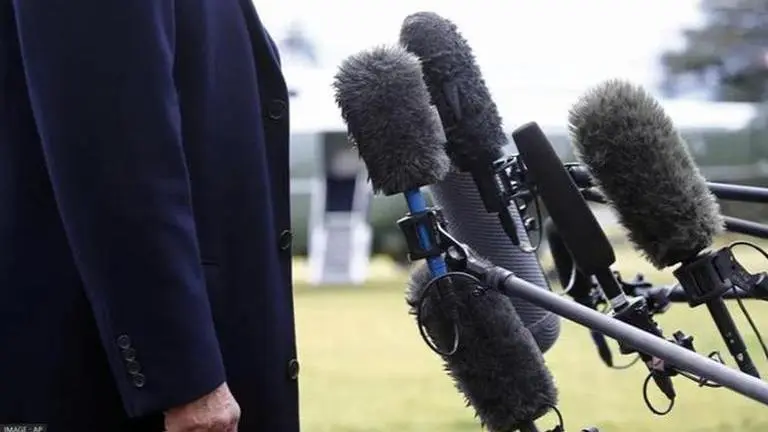Updated 3 May 2023 at 16:57 IST
World Press Freedom Day | Media freedom under threat in record number of countries: Report
Media freedom is in dire health in a record number of countries, as per the latest annual snapshot, which warns of threats like disinformation, propaganda & AI.
- World News
- 4 min read

The most recent yearly overview indicates that media freedom is suffering severely in an unprecedented number of nations, with disinformation, propaganda, and the increasing influence of artificial intelligence being cited as significant risks to the field of journalism.
According to the World Press Freedom Index, there has been a disturbing decline, with 31 countries getting classified as being in a "very serious situation," which is the lowest ranking in the report. This represents a significant increase from just two years ago when 21 countries received this ranking.
Reporters Without Borders (RSF), the advocacy group responsible for releasing the list, has stated that the situation has worsened due to the heightened aggressiveness of autocratic governments, as well as of some that are considered democratic. This, combined with "massive disinformation or propaganda campaigns", has caused the situation to deteriorate further.
“There is more red on the RSF map this year than ever before, as authoritarian leaders become increasingly bold in their attempts to silence the press,” the RSF secretary general, Christophe Deloire, told the Guardian. “The international community needs to wake up to reality, and act together, decisively and fast, to reverse this dangerous trend.”
The first World Press Freedom Day was established 30 years ago, on Wednesday, with the intention of reminding governments of their obligation to preserve freedom of expression. However, according to RSF, the current journalism climate is regarded as "bad" in seven out of 10 countries, with only three out of 10 countries deemed satisfactory. Furthermore, the United Nations reports that 85% of individuals reside in nations where media freedom has deteriorated in the previous five years.
Advertisement
The survey examines the status of the media in 180 countries and territories, evaluating the capacity of journalists to report on news that is in the best interest of the public, without any hindrance or danger to their personal safety.
Fake content, propaganda, and AI are the threats: Report
The survey reveals that rapid technological advancements have enabled governments and political figures to manipulate reality, and fake content can now be disseminated more easily than ever before.
Advertisement
“The difference is being blurred between true and false, real and artificial, facts and artifices, jeopardising the right to information,” the report said. “The unprecedented ability to tamper with content is being used to undermine those who embody quality journalism and weaken journalism itself.”
Artificial intelligence was “wreaking further havoc on the media world”, the report said, with AI tools “digesting content and regurgitating it in the form of syntheses that flout the principles of rigour and reliability”.
This is not just written AI content but visuals, too. High-definition images that appear to portray real people can be generated in seconds.
Moreover, governments are increasingly engaging in a propaganda battle. Russia, which already suffered a drop in its rankings last year due to the Ukraine invasion, has slipped further down to nine positions. The state media is accused of blindly echoing the Kremlin's viewpoint, while opposition media is being forced into exile. In addition, last month, Moscow detained Evan Gershkovich, a reporter for the Wall Street Journal, on espionage charges. He was the first American journalist to be detained in Russia since the end of the Cold War.
Several nations slipped from previous rankings
Three countries - Tajikistan, India, and Turkey - have moved from the "problematic situation" category to the lowest level. According to RSF, in Turkey, the government of the uncompromising President Recep Tayyip Erdoğan has intensified its crackdown on journalists ahead of the upcoming elections scheduled for May 14. Turkey currently incarcerates more journalists than any other democratic nation.
The largest drops in the 2023 index occurred in several African countries. Senegal, which until recently was viewed as a model nation in the region, has dropped 31 positions, primarily due to criminal charges leveled against two journalists, Pape Alé Niang and Pape Ndiaye. Tunisia has fallen 27 spots due to the increasing authoritarianism of President Kais Saied.
The Middle East remains the most perilous area for journalists globally. However, in the Americas, no country has a "good" rating (green) on the press freedom map. The United States has dropped three places, ranking 45th on the list. In the Asia Pacific region, the presence of hostile regimes towards journalists, such as Myanmar (173rd) and Afghanistan (152nd), has contributed to the region's overall lower ranking.
“We are witnessing worrying trends, but the big question is if these trends are a hiccup or a sign of a world going backwards,” said Guilherme Canela, the global lead on freedom of speech at Unesco. “Physical attacks, digital attacks, the economic situation, and regulatory tightening: we are facing a perfect storm.”
Published By : Digital Desk
Published On: 3 May 2023 at 16:55 IST
